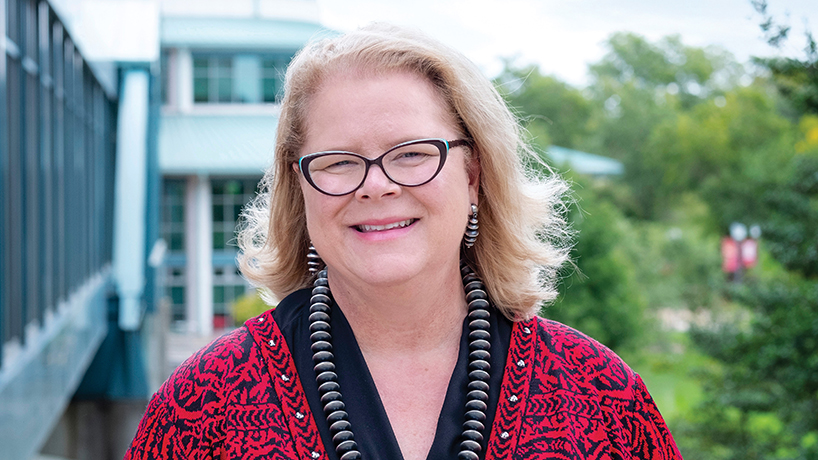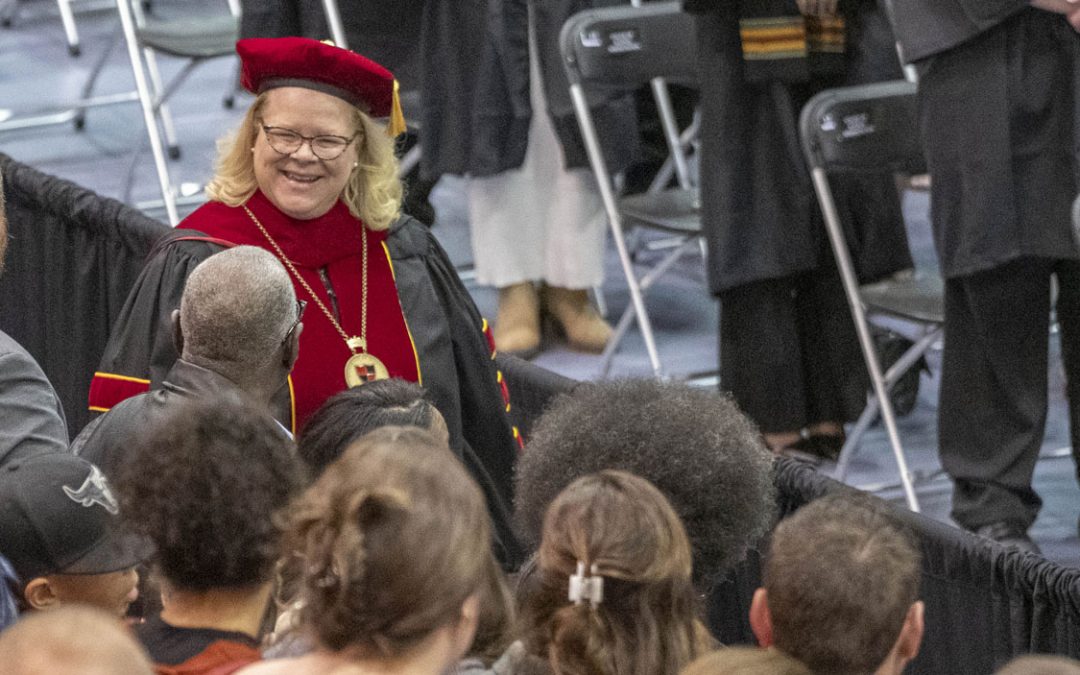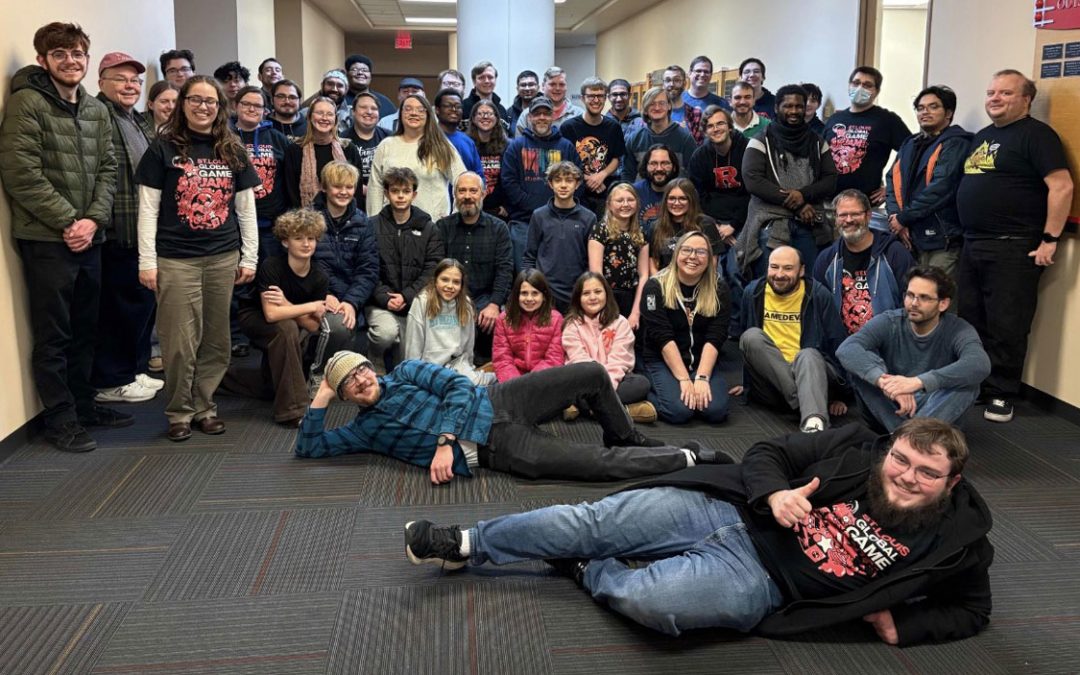
Chancellor Kristin Sobolik aims to help the University of Missouri–St. Louis take a more active role fostering inclusive prosperity in the St. Louis region. (Photo by August Jennewein)
It was a sunny afternoon in mid-August, and Kristin Sobolik was back in her corner office in Woods Hall after spending most of the previous five months working remotely amid the COVID-19 pandemic.
Sobolik had moved into the space the previous fall when she took over as the interim chancellor at the University of Missouri–St. Louis, but she still had a few things she hadn’t had a chance to unpack – items she decided to bring over only after learning she’d be keeping the office with her appointment as the eighth chancellor in the university’s history in April.
Had she looked out her windows, Sobolik could have seen the Science Complex to the west and the J.C. Penney Conference Center to the north and, way in the distance, the University Libraries. But her mind at that moment was trained even farther away as she talked about her new position and what she’s hoping to accomplish in it.
Topping that list is a desire to see UMSL grow its influence in the St. Louis region.
“It is time to take our rightful place in St. Louis as the leader that we are and own it,” Sobolik says. “We have really relied on being a young institution for too long. We’re too long in the tooth for that.”
She would also like to see the university take a more active role in pushing the region forward.
UMSL alumni make up an outsized share of the St. Louis workforce with nearly 75 percent of the university’s graduates living and working in the region. Those deep connections can help facilitate dialogue and forge solutions to large-scale issues.
Sobolik’s calendar is often filled with meetings with other civic and business leaders as well as friends, donors and advocates that support UMSL’s efforts to be an institution promoting opportunity for all people, regardless of their backgrounds.
Lately, Sobolik has been working closely with counterparts at some of the region’s leading institutions to develop a plan for more equitable economic development, including in the City of St. Louis, St. Louis County and St. Charles County. It includes more conscious hiring and purchasing practices in underinvested communities.
“The way we’ve carved up our society and the way we’ve carved up opportunity and concentrated low-income people and people of color in very specific spaces is not healthy for our region,” says Karl Guenther, UMSL’s assistant vice chancellor of economic and community development, who has been working closely with Sobolik on these issues. “It leaves a tremendous number of people out of the equation and makes it difficult for them to reach their full potential.”
There’s an increasing realization that the status quo is not sustainable. The region has watched its population remain relatively flat over the past two decades while some of its biggest companies have departed for other cities. To reverse those trends will require lifting up more people and incorporating their talents as an integral and essential part of the solution.
Sobolik and her colleagues have been building broader plans for regional economic development that create and enhance connections and collaborations with some of the larger institutions in the region. UMSL has a unique role to play in promoting equity and inclusive economic growth and prosperity because it provides high-quality, affordable education to so many of the students who grow up in the region’s underinvested communities. About 30 percent of UMSL students are underrepresented minorities, 48 percent are Pell Grant-eligible, and they have a median household income of about $34,000 annually.
“I think we can be at the forefront of finding solutions because of who we are as a public, urban institution and the student demographics that we serve,” Sobolik says.
That’s in addition to the research and expertise UMSL faculty and staff direct toward solving civic and regional challenges.
UMSL has been recognized nationally as a leader in social mobility. The degrees students earn can transform their financial futures, and they in turn can use their skills to enhance the St. Louis workforce.
Sobolik knows as well as anyone the power of education. She grew up in Charles City, Iowa, and was the first member of her family to attend college, working her way through school at the University of Iowa to earn a degree in biology.
She spent the summer between her junior and senior years doing an archeological excavation in the Southwestern United States, sparking a love for anthropology. That led her to Texas A&M University, where she earned both her master’s and PhD and helped pioneer the fields of archaeobiology and paleonutrition.
After a postdoctoral fellowship at Southern Illinois University Carbondale, Sobolik launched her career in higher education when she landed her first faculty position in the Department of Anthropology at the University of Maine in 1992. The job came with a joint appointment to the university’s renowned Climate Change Institute, and her work there – first as graduate director and eventually associate director – helped foster her passion for tackling societal problems, even outside her academic area of expertise.
Sobolik spent more than 20 years at Maine, rising to the rank of professor as well as associate dean for research and external affairs in the College of Liberal Arts and Sciences.
After much thought, she and her husband, Scott Peterson, decided to make a move that took them closer to their roots in the Midwest. Sobolik accepted a position as dean of the College of Liberal Arts at Wright State University.
She knew the decision to come to UMSL, first as provost in 2017 and now as chancellor, would mean familiarizing herself with a whole new set of challenges and opportunities.
“I think one of the first things that Kristin said, which I appreciated as a native of St. Louis, was that she was reading a book to learn more about the history,” says Tanisha Stevens, UMSL’s vice chancellor for institutional effectiveness and compliance. “She was being intentional and trying to understand more about the community, with issues like the Delmar Divide. She had a willingness to learn more, the willingness to understand why it has been difficult.”
Recently, Sobolik read “The Broken Heart of America: St. Louis and the Violent History of the United States,” by historian and Harvard University Professor Walter Johnson. The book traces the turbulent history of the city, from Lewis and Clark’s expedition in 1804 through the civil unrest in Ferguson in 2014 and shows the racial dynamics at play throughout that history that have served to continually disadvantage minority communities.
“I felt like I was reading about certain aspects of history for the first time, and this was as an anthropologist,” Sobolik says.
It’s only strengthened her resolve to ensure UMSL is doing everything it can to promote investment and opportunity in the communities that need it most.
“I’m motivated by tackling big issues and forming the team to be part of the solution, whether it’s environmental policy or whether it’s how to advance inclusive prosperity as foundational for economic development,” Sobolik says. “When I was working on environmental policy, I thought, ‘What can be bigger and more important than climate change?’ I think foundational, racial inequality may top it, and it’s going to take all of us working together to help solve it.”
This story was originally published in the fall 2020 issue of UMSL Magazine. If you have a story idea for UMSL Magazine, email magazine@umsl.edu.














